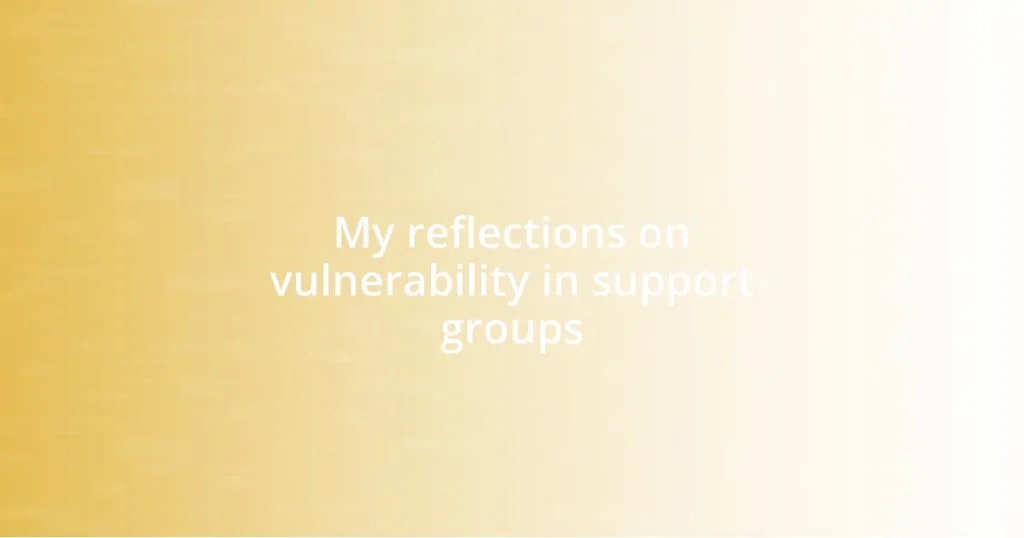Key takeaways:
- Vulnerability in support groups fosters connection, allowing members to share their struggles and feel less isolated.
- Creating a safe space free from judgment is vital for building trust and encouraging openness among participants.
- Sharing vulnerabilities leads to emotional release, empathy, and personal growth within the group.
- Active listening and consistent meetings enhance trust and deepen connections between group members.

Understanding vulnerability in groups
When I think about vulnerability in groups, I often reflect on a poignant moment during my own support group experience. There was a time when I felt completely exposed, sharing a struggle that I usually kept hidden. It struck me how, in that moment, vulnerability wasn’t just about bare emotions; it fostered connection and understanding among the group members. Have you ever felt that rush of relief when you realize you’re not alone in your struggles? That’s the magic of vulnerability.
In my experience, vulnerability acts as a bridge among group members, leading to deeper, more meaningful conversations. Take, for instance, a different support group meeting where someone shared a story that resonated with all of us. I saw tears and laughter blend together as we connected through shared pain and triumph. It’s powerful to witness how a single act of openness can transform a room filled with strangers into a safe haven.
It’s important to remember that vulnerability doesn’t mean we have to reveal everything at once. Some conversations require gentleness and timing. I often find that pacing vulnerability provides a layer of safety, allowing members to build trust gradually. So, what do you think? Is it easier to open up in a small, intimate setting, or do larger groups create a sense of anonymity that makes sharing easier? From what I’ve seen, both settings have their strengths, but it all boils down to the connection we create with each other.

The role of support groups
Support groups serve as crucial spaces where individuals can connect over shared experiences. I remember attending a group where, after a heartfelt discussion, someone light-heartedly commented on how we had become each other’s cheerleaders. That sense of camaraderie was not just uplifting; it was a reminder that we’re all in this together. In these environments, members often find not only validation but also encouragement to explore their vulnerabilities.
- They create a safe space for sharing without judgment.
- Participants can witness and relate to others’ experiences, fostering empathy.
- Members often develop meaningful connections that extend beyond meetings.
- Support groups facilitate personal growth through shared insights and collective wisdom.
- They encourage accountability, helping individuals stick to their goals.
In essence, support groups aren’t just about talking; they’re essential for cultivating understanding and connection among individuals who often feel isolated. It always amazes me how the most profound insights often arise when we least expect them, simply through the act of sharing our stories.

Benefits of sharing vulnerabilities
Sharing vulnerabilities in support groups offers profound benefits that often transcend mere conversation. When I first opened up about my fears in a group, I felt a weight lifted off my shoulders. The immediate relief I experienced was palpable, reminding me that vulnerability can lead to emotional release and healing. This process not only helps us feel less alone but also allows others to step forward and share their own struggles, creating a ripple effect of openness and support.
In addition to fostering connection, sharing vulnerabilities helps to build empathy within the group. I remember a session where someone spoke about their battle with anxiety. As they expressed their feelings, I could almost feel the room shift as others nodded in understanding, reflecting back their own stories of fear and doubt. This moment solidified the idea that vulnerability can unify us, turning an individual experience into a collective journey. How often have you felt inspired to share your own story when you hear someone else brave enough to share theirs?
Moreover, sharing vulnerabilities can enhance personal growth among group members. I’ve seen participants leave behind their defensive walls, embracing the notion that it’s okay to be imperfect. This newfound authenticity encourages each person to explore and reflect on their own lives, ultimately leading to self-discovery and strength. When we allow ourselves to be seen truly, we open the door to transformative change that can echo far beyond our time spent in the group.
| Benefit | Explanation |
|---|---|
| Emotional Release | Sharing vulnerabilities can lead to a cathartic experience, helping individuals feel lighter and more at ease. |
| Fostering Empathy | Hearing others’ stories cultivates understanding and compassion, creating strong connections among participants. |
| Encouraging Growth | Openness inspires personal exploration and self-reflection, facilitating transformative change. |

Creating safe spaces for sharing
Creating a safe space for sharing is essential in any support group. I distinctly remember a night when the atmosphere felt tense; people were hesitant to speak. But when one brave soul shared her story of loss, it opened the floodgates for others. I’ve found that the first step to safety is that initial act of vulnerability—when someone dares to be open, it empowers everyone else to follow suit.
Establishing an environment free from judgment is foundational to building trust. I’ve seen groups flourish when ground rules are established, such as confidentiality and respect. During one session, we all agreed to listen without interrupting, allowing each person to feel fully heard. Isn’t it comforting to know that in that moment, our experiences wouldn’t be critiqued but cherished? That commitment to honor each story is what transforms these gatherings into sanctuaries of understanding.
I can’t help but reflect on the camaraderie that forms in these safe spaces. One evening, after a deep discussion, a group member handed out small tokens—simple heart-shaped stones—as reminders of our shared commitment to support one another. It was a small gesture but left a big impact, reinforcing that we were not just individuals sharing burdens; we were a community committed to lifting each other up. How powerful is it to feel you belong? That sense of connection enriches our experience and encourages even deeper sharing in the future.

Strategies for opening up
Opening up in a support group can feel daunting at first. I remember sitting in my own group, feeling like an outsider, when someone shared their struggle with grief. In that moment, something shifted—I realized I wasn’t alone in my pain. This made me wonder, how often do we underestimate the power of one brave voice to inspire others?
Another effective strategy is to start with a simple prompt. For example, in one group, we used the question, “What’s weighing heavily on your heart right now?” It was amazing to see how this open-ended inquiry allowed members to delve into their feelings. I found that when I heard the honesty in others’ responses, it became easier to peel back my own layers of hesitation. What if we all had such prompts ready to spark deeper conversations?
Additionally, sharing something small and relatable can be an excellent stepping stone. One evening, I shared a playful mishap from my week—it was lighthearted, but it opened the door for more serious discussions later. This led me to ponder, don’t we often forget that vulnerability can also be found in everyday moments? By approaching our stories with a mix of lightness and seriousness, we create a dynamic environment where everyone feels encouraged to participate and share, transforming the group experience into something truly enriching.

Overcoming fear of vulnerability
Embracing vulnerability can be a profound challenge, often rooted in fear of judgment or rejection. I recall a moment in my own support group when I decided to share a particularly vulnerable experience. As I spoke, I felt my heartbeat quicken, wondering what others would think. But the warmth of their empathetic nods and supportive smiles reminded me that we were all in this together—this shared experience transformed worry into connection.
One effective way I’ve found to combat this fear is by reflecting on the strength it takes to be vulnerable. During another group session, I voiced my fears about opening up and was struck by how many others felt the same. In that instance, I realized vulnerability is not a weakness; it’s a powerful testament to our shared humanity. Recognizing that these fears are universal can lighten the burden and make it easier to take that initial leap.
Lastly, I sometimes think about how vulnerability can lead to liberation. Once, I shared a secret I had kept buried for years, and my heart raced as I revealed it. The response was overwhelmingly supportive, but what struck me most was how unshackled I felt afterward. Isn’t it fascinating how revealing our true selves can free us from the weight of those hidden burdens? By taking small steps and sharing our stories, we create an environment where vulnerability is embraced, leading to deeper connections and healing among everyone involved.

Building trust within support groups
Building trust in a support group is like nurturing a delicate plant; it needs care and attention to thrive. I recall a time when one participant shared a deeply personal story, one that I could relate to on many levels. As she spoke, I could feel the room shift; it was as if her courage breathed life into our collective atmosphere. Have you ever felt that same transformative energy when someone else opens up? It’s remarkable how one person’s vulnerability can create an inviting space for others to follow suit.
Establishing trust often begins with active listening. In my experience, when group members took the time to validate each other’s stories—offering nods, affirmations, or even simple follow-up questions—the connection between us deepened. I remember one session where we all took turns reflecting on what we’d heard. This practice of engaging with one another’s narratives not only fostered trust but also cultivated empathy, reminding me how much we all yearn to be seen and understood.
Additionally, I’ve found that consistency in meetings plays a crucial role in building trust. Whenever we gathered regularly, it felt like we were creating a safe haven. I once missed a couple of sessions due to unforeseen circumstances and returned to find that my absence had been felt. It struck me how much we become part of each other’s support systems, like threads woven into a tapestry. Isn’t it comforting to know that while we each face our struggles alone, there’s a thread of connection that binds us?















